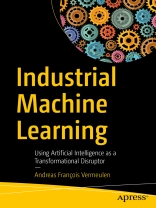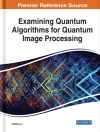Understand the industrialization of machine learning (ML) and take the first steps toward identifying and generating the transformational disruptors of artificial intelligence (AI). You will learn to apply ML to data lakes in various industries, supplying data professionals with the advanced skills required to handle the future of data engineering and data science.
Data lakes currently generated by worldwide industrialized business activities are projected to reach 35 zettabytes (ZB) as the Fourth Industrial Revolution produces an exponential increase of volume, velocity, variety, variability, veracity, visualization, and value. Industrialization of ML evolves from AI and studying pattern recognition against the increasingly unstructured resource stored in data lakes.
Industrial Machine Learning supplies advanced, yet practical examples in different industries, including finance, public safety, health care, transportation, manufactory, supply chain, 3D printing, education, research, and data science. The book covers: supervised learning, unsupervised learning, reinforcement learning, evolutionary computing principles, soft robotics disruptors, and hard robotics disruptors.
What You Will Learn
- Generate and identify transformational disruptors of artificial intelligence (AI)
- Understand the field of machine learning (ML) and apply it to handle big data and process the data lakes in your environment
- Hone the skills required to handle the future of data engineering and data science
Who This Book Is For
Intermediate to expert level professionals in the fields of data science, data engineering, machine learning, and data management
विषयसूची
Chapter 1: Introduction.- Chapter 2: Background Knowledge.- Chapter 3: Classic Machine Learning .- Chapter 4: Supervised Learning: Using labeled data for Insights.- Chapter 5: Supervised Learning: Advanced Algorithms.- Chapter 6: Unsupervised Learning: Using Unlabeled Data.- Chapter 7: Unsupervised Learning: Neural Network Toolkits.- Chapter 8: Unsupervised Learning: Deep Learning.- Chapter 9: Reinforcement Learning: Using Newly Gained Knowledge for Insights.- Chapter 10: Evolutionary Computing.- Chapter 11: Mechatronics.- Chapter 12: Robotics Revolution.- Chapter 13: Fourth Industrial Revolution (4IR ).- Chapter 14: Industrialized Artificial Intelligence.- Chapter 15: Final Industrialization Project.- Appendix: Reference Material.-
लेखक के बारे में
Andreas François Vermeulen is Chief Data Scientist and Solutions Delivery Manager at Sopra-Steria and he serves as part-time doctoral researcher and senior research project advisor at University of St. Andrews on future concepts in health care systems, Internet of Things (Io T) sensors, massive distributed computing, mechatronics, at-scale data lake technology, data science, business intelligence (BI), and deep machine learning in health informatics.
Andre maintains and incubates the Rapid Information Factory data processing framework. He is active in developing next-generation data processing frameworks and mechatronics engineering with over 36 years of global experience in complex data processing, software development, and system architecture. He is an expert data scientist, doctoral trainer, corporate consultant, and speaker/author/columnist on data science, business intelligence, machine learning, decision science, data engineering, distributed computing, and at-scale data lakes. He has expert-level industrial experience in various areas (finance, telecommunication, manufacturing, government service, public safety and health informatics).
Andre received his bachelor’s degree from North West University at Potchefstroom, his Master of Business Administration (MBA) at University of Manchester, his Master of Business Intelligence and Data Science degree at University of Dundee, and his Doctor of Philosophy at University of St. Andrews.












